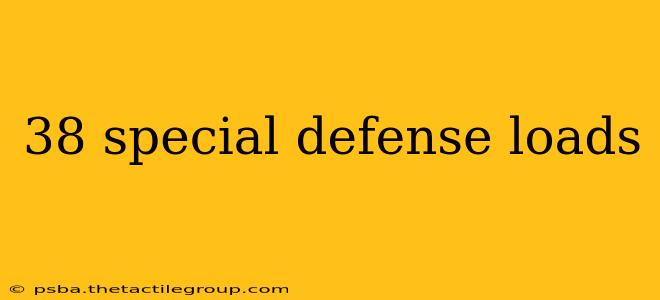The .38 Special remains a popular cartridge for self-defense, offering a balance of manageable recoil and stopping power. However, choosing the right ammunition is crucial. This guide explores various .38 Special defense loads, their characteristics, and what to consider when selecting the best option for your needs.
Understanding .38 Special Ammunition for Self-Defense
The effectiveness of a .38 Special defense load hinges on several factors: bullet type, weight, and velocity. Different manufacturers offer diverse options, each with its strengths and weaknesses.
Bullet Types:
-
Hollow Point (JHP): Hollow point bullets expand upon impact, creating a larger wound cavity and increasing stopping power. They are generally preferred for self-defense due to their increased energy transfer and reduced overpenetration. However, their expansion can be affected by factors like the bullet's construction, velocity, and the material it strikes.
-
Full Metal Jacket (FMJ): FMJ bullets are entirely encased in metal, resulting in less expansion and higher penetration. While suitable for target practice, they are generally less effective for self-defense due to the risk of overpenetration, potentially harming bystanders. They are not recommended for self-defense applications.
-
Semi-wadcutter Hollow Point (SWCHP): These bullets combine features of both hollow points and wadcutter designs. They offer a balance between expansion and penetration, making them a viable option in some scenarios. Performance can vary significantly based on the specific manufacturer and load.
Bullet Weight & Velocity:
Heavier bullets generally transfer more energy, resulting in increased stopping power. However, heavier bullets also tend to have lower velocities. Conversely, lighter bullets achieve higher velocities but may have less stopping power. The optimal balance depends on your firearm and personal preferences. It's advisable to test different loads in your specific firearm to determine what performs best.
Top .38 Special Defense Loads to Consider (Note: This is not an exhaustive list and performance can vary; always test ammunition in your firearm)
While specific brand recommendations are avoided to remain unbiased, several factors should guide your choice. Look for reputable manufacturers with a proven track record. Consider the following:
-
Consistent Expansion: Look for ammunition known for reliable expansion across various materials and velocities. This ensures consistent performance in real-world self-defense scenarios.
-
Controlled Recoil: Excessive recoil can hinder follow-up shots, which are often critical in a self-defense situation. Choose a load that allows for controlled and accurate shot placement.
-
Accuracy: Ammunition must be accurate in your specific firearm. Test different brands and loads to find one that delivers consistent accuracy at typical self-defense ranges.
-
Penetration: The ideal balance is sufficient penetration to neutralize a threat without excessive overpenetration. This is a crucial consideration for safety, especially in populated areas.
Factors to Consider Beyond the Ammunition Itself
Choosing the right .38 Special defense load is just one piece of the puzzle. Effective self-defense involves:
-
Proper Training: Training is essential to develop proficiency with your firearm and learn safe handling practices. Regular practice is critical to building muscle memory and improving accuracy under stress.
-
Firearm Maintenance: Regular cleaning and maintenance ensure your firearm functions reliably when you need it most.
-
Legal Considerations: Familiarize yourself with your local laws regarding firearm ownership, carrying, and self-defense.
Conclusion
Selecting the appropriate .38 Special defense load requires careful consideration of bullet type, weight, velocity, and performance characteristics. Thorough research, testing with your specific firearm, and comprehensive training are crucial for ensuring you have the best possible tools for self-defense. Remember, responsible firearm ownership involves understanding your responsibilities and limitations. Always prioritize safety and legality.

